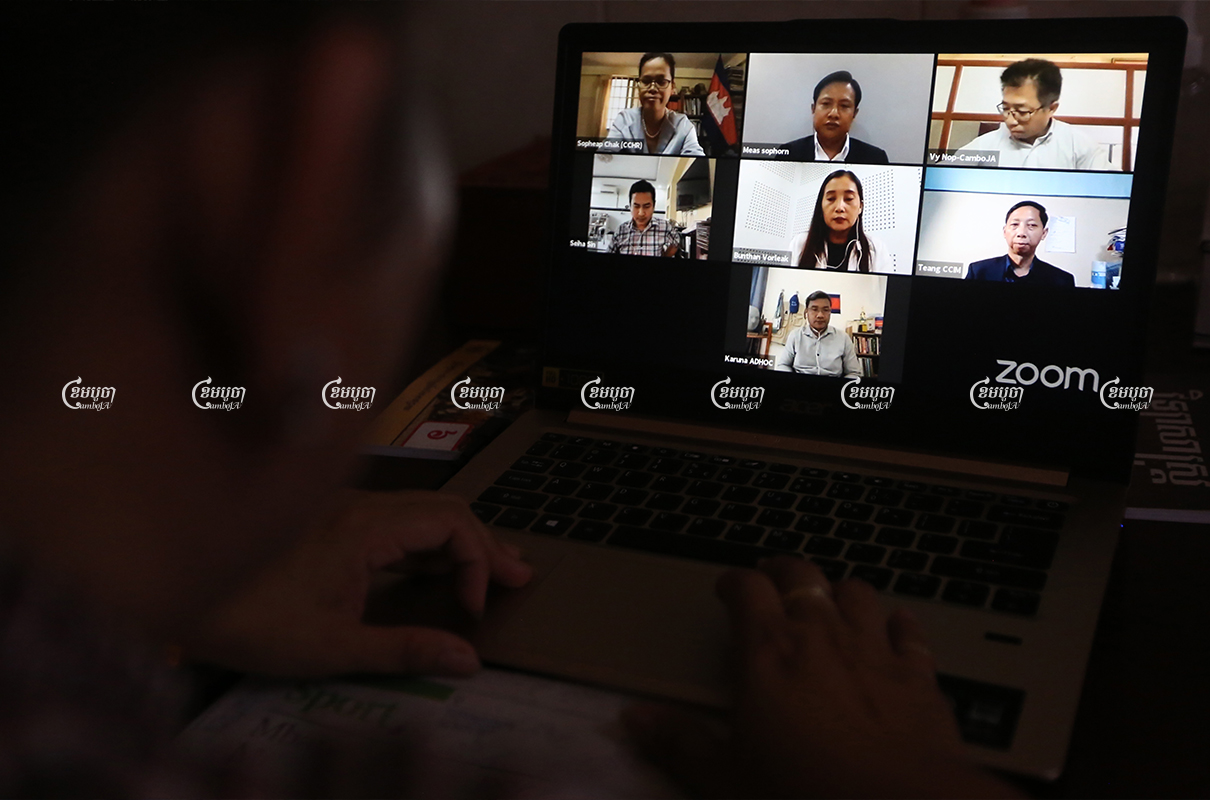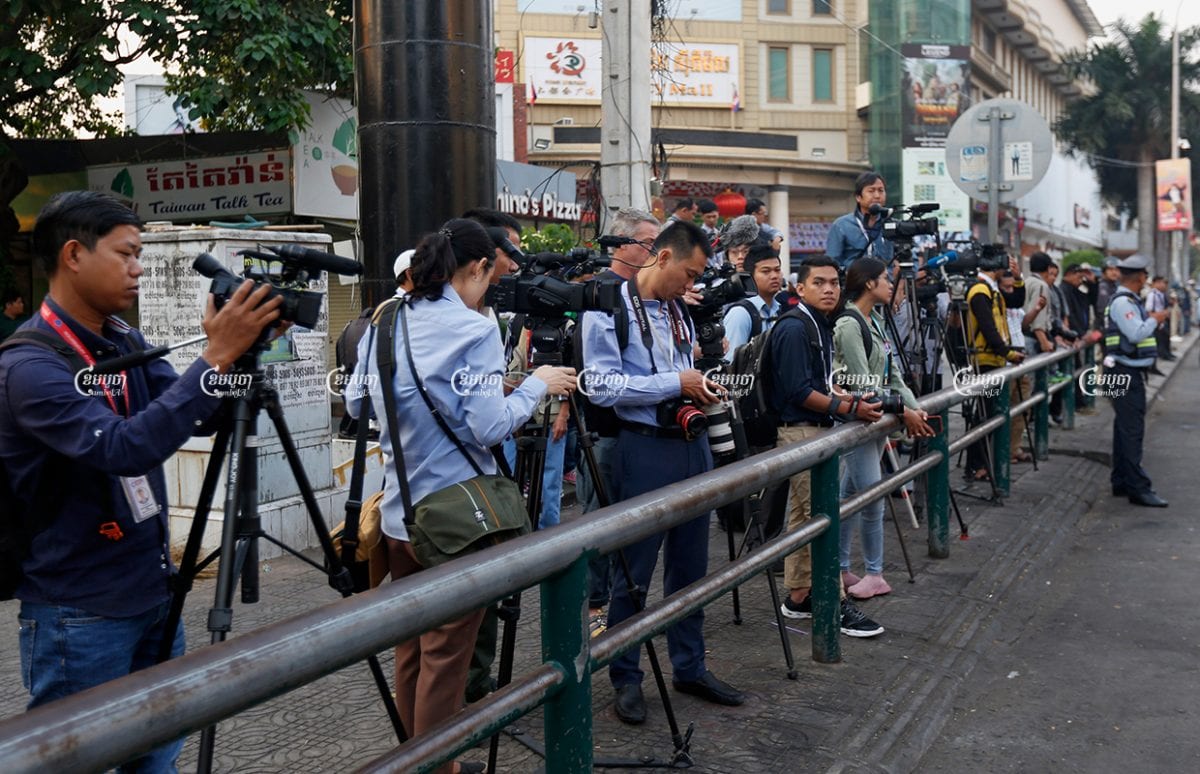Press freedom in Cambodia is getting worse as a result of an ongoing government crackdown on independent media, including threats, violence and the imprisonment of journalists, a number of civil society groups and media associations have said on World Press Freedom Day. A spokesperson for the Ministry of Information rejected the allegation, insisting that the nation’s press continued to operate freely and smoothly. Reporters Without Borders ranked Cambodia 144th out of 180 countries in the 2020 World Press Freedom Index.
Thirteen media associations and NGOs, including the Cambodian Journalists Alliance Association (CamboJA), commemorated World Press Freedom Day through an online panel discussion on May 3, 2021 on the increasingly stifling environment facing the nation’s press. They were joined by a number of officials from the Ministry of Information.
Cambodian Center for Independent Media (CCIM) founder and executive director Pa Nguon Teang said that the spread of COVID-19 in Cambodia had only made things harder for Cambodia’s journalists.
“The current government has used the political situation and taken the opportunity of the COVID-19 transmission to restrict press freedom,” he said.
“For me, when there is a stronger restriction on press freedom, that society will lose good governance,” he added.
Mr Nguon Teang noted that Cambodia’s press freedom had been declining since 2017, when the government launched its crackdown on freedom of expression, targeting independent media and shutting down the US-supported Radio Free Asia and The Cambodia Daily newspaper.
He added that CCIM had conducted a survey of independent journalists which showed that the majority are worried about reporting on sensitive issues such as corruption, deforestation, environmental and political issues.
In a separate report released in March, CamboJA recorded 35 cases of harassment against 72 journalists. The most common types of harassment were imprisonment and violence, with online journalists, who made up 64 of the 72 cases, facing the brunt of the authorities’ intolerance of critical journalism. Many of these attacks were linked in part to the government’s crackdown on free expression as a result of the COVID-19 pandemic.
Sovann Rithy, director of online news outlet TVFB, was sentenced to 18 months in prison in October after he reported on a speech by Prime Minister Hun Sen advising motorbike taxi drivers to sell their vehicles in response to the economic impact of COVID-19. Rithy had already spent six months in pre-trial detention, and had the remainder of his sentence suspended. In December, Rithysen Radio Station owner Sok Oudom was sentenced to 20 months in prison on incitement charges after reporting on a land dispute between villagers in Kampong Chhnang Province and a senior military official.

Despite these reports, Information Ministry spokesman Meas Sophorn rejected the idea that Cambodia’s press freedom has declined, stating that the government had made efforts to protect the rights of journalists, including the right to publish freely.
“I would like to tell you that rights and press freedom in Cambodia are still carried out properly, and there is a better situation even if we are under the situation of COVID-19,” he said.
As evidence, Mr Sophorn said that the number of online media outlets had increased to 669 compared to just 107 in 2019, and that the ministry had now issued 4,230 media passes for national and international journalists working in Cambodia. He claimed that civil society groups often accused the government of violating press freedom when they took legal action against media institutions or journalists who had broken the law.
“Did you consider those journalists who had done the wrong thing, as they had been accused by the authorities?” Mr. Sophorn asked. “The rights of a free press, especially freedom of expression, have been followed in line with Cambodia’s laws.”
Not everyone, though, is convinced. Soeng Senkarun, a senior investigator at rights group Adhoc, said that many journalists have complained that they have no rights to access information at some press events — the exception, he said, being journalists who support the government.
“This clearly shows that there is discrimination against some journalists,” he said.
Khan Leakhena, a reporter at CCIM-managed media outlet VOD, agreed that journalists are still threatened by authorities in the course of their work.
“I used to be threatened by authorities when I went down to report at the field,” she said. The journalist shared her experience covering the trial of a number of opposition members at the Phnom Penh Municipal court, where she said she had been threatened and chased by authorities while trying to take pictures, finally having her phone confiscated.
Ms Leakhena maintained that journalists are still worried by the fact that the government continues to use the Criminal Code against journalists, rather than the Press Law created expressly as an alternative to criminal proceedings.
“I think if journalists are still under threat, Cambodia’s media will not improve in the future,” she said.








